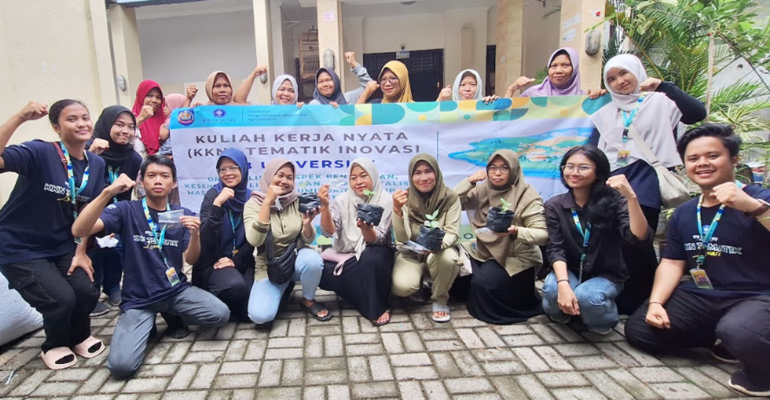Innovation Real-Thematic Work Lecture Students in Tegal Encourage Women to Plant IPB University’s Innovative Seeds

Large chili seeds of Arisa IPB, Bonita IPB bird’s eye chili, and Tora IPB tomatoes were carefully placed into seed trays by women. Some curious children joined in, adding to the cheerful atmosphere of the morning’s seeding activity. It was truly a delightful experience!
IPB University students, the Innovation Real-Thematic Work Lecture (KKNT Innovation) team, successfully conducted a family kitchen garden seedling activity with women in Sumingkir Village, Kedungbanteng District, Tegal Regency, Central Java. The seeds were superior varieties, innovative products of IPB University, brought directly from Bogor.
Various innovative IPB University varieties were planted, including Tora IPB tomatoes, Arisa IPB large chilies, and Bonita IPB bird’s eye chilies. Additionally, various other kitchen garden plants were also planted, such as Mustang F1 purple eggplant, Pondoh Bondan purple eggplant, and tomato for sauces.
Before starting, Bintang, a KKNT Innovation student from the Department of Agronomy and Horticulture, explained the seeds and their cultivation methods, including seeding, planting, fertilizing, maintenance, and harvesting. He also discussed the growing requirements, seed business process, and market potential.
Aji, a student of Land Resource Management at IPB University, emphasized the importance of planting media composition. “Generally, soil taken from the field for seedling media, without adding other materials like charcoal, rice husks, and manure, is not sufficient to support plant growth and productivity,” he explained.
Aji also mentioned that manure not only adds nutrients to the planting media but also increases soil porosity and water retention capacity. Charcoal from rice husks, he noted, is ‘porous,’ allowing good water drainage and loosening the soil, making it easier for plant roots to absorb nutrients.
“This way, root moisture will be well maintained. These organic materials improve soil properties and help bind nitrogen, phosphorus, and potassium (NPK) in the soil,” he added.
The women eagerly followed the demonstration of making planting media and seeding. The planting media used was a mixture of soil, burnt husks, and goat manure in a 1:1:1 ratio, moistened with water. After being evenly mixed, this planting media was placed into seed trays.
Mufatihah, a representative of the Family Welfare Empowerment (PKK) group who participated in the seeding activity, expressed her satisfaction with the family kitchen garden seeding and planting event.
Another participant, Khofsah, a representative from the Farmers Group Association (Gapoktan) of Sumingkir Village, added that planting in the yard could enhance the economy, increase women’s knowledge, and help save daily expenses.
The KKNT Innovation team of IPB University hopes that the women of Sumingkir Village will continue to utilize their yards by planting these family kitchen garden plants sustainably to achieve family food security. (*/Rz) (IAAS/RUM)



